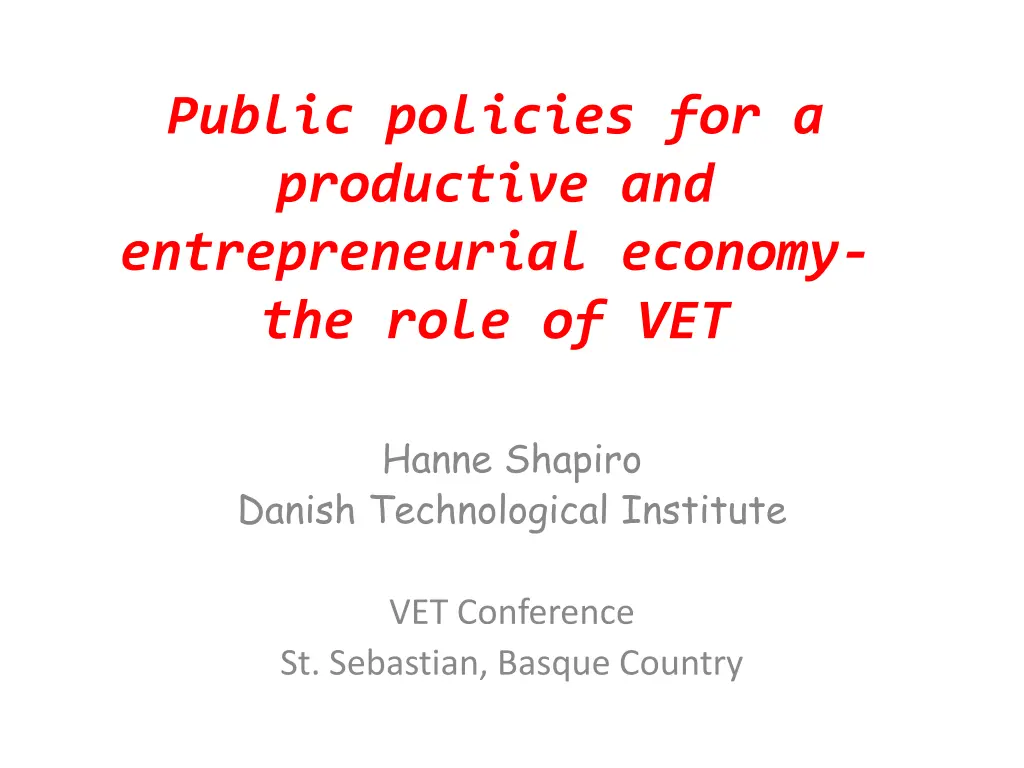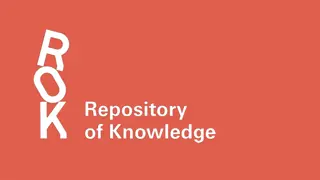
Role of VET in Productive & Entrepreneurial Economy: Insights from VET Conference
Explore the vital role of Vocational Education and Training (VET) in fostering a productive and entrepreneurial economy, delving into issues and emerging opportunities for SMEs in innovation and skills development, as discussed at a conference in St. Sebastian, Basque Country.
Download Presentation

Please find below an Image/Link to download the presentation.
The content on the website is provided AS IS for your information and personal use only. It may not be sold, licensed, or shared on other websites without obtaining consent from the author. If you encounter any issues during the download, it is possible that the publisher has removed the file from their server.
You are allowed to download the files provided on this website for personal or commercial use, subject to the condition that they are used lawfully. All files are the property of their respective owners.
The content on the website is provided AS IS for your information and personal use only. It may not be sold, licensed, or shared on other websites without obtaining consent from the author.
E N D
Presentation Transcript
Public policies for a productive and entrepreneurial economy- the role of VET Hanne Shapiro Danish Technological Institute VET Conference St. Sebastian, Basque Country
Envisioning- Aligning Engaging
Background- analysis SME s in global value chains- role of digital technologies State of Affairs- Manufacturing industry EU- European Parliament SME growth strategies- international best practice- design of Danish SME Growth Programme PIAAC data- Adult Learning indicator- DG EAC VET Excellence- VET and innovation- DG EAC World Economic Forum- Work on Employment rich recovery- role of apprenticeship
7 Emerging issues Biggest SME challenge in EU 28- lack of customer demand Major changes in markets/ inclusive innovation as growth opportunity- OECD World Bank, World Economic Forum? Limitations of skills supply policies
7 Major Isssue emerging Cont The role of VET in economic development and innovation? Unrecognised role of the skilled worker in innovation in SMEs- DUI Innovation- But not all SMEs are set to exploit that opportunity VET excellence?
Opportunity space for SMEs Multinationals concentrate number of SME suppliers become partners in innovation Digital technologies become a proxy for efficiency and a means of cooperating across firm boundaries /( shared standards ) Growing integration of products , components, systems and services- modularisation a means to meet diversified demand cost- effectively Critical factor : capabilities at the shop floor level DUI Innovation modularised products/services
BIG policy question- implications on VET?????? Digital taylorism to improve efficiency/ productivity in European SMEs or The shop floor not a cost but a source of innovation (the role of the shop floor/ front line worker)
Skills Utilisation Efficient skills policies must address skills utilisation Implication on VET systems: From training providers to ?? Numerous programmes aimed at enhancing the skills of the future existing workforce Few programmes at scale that situate work organization , job redesign, technology utilisation and skills as a means of improving competitiveness
Innovation : to orchestrate teaching and learning processes- R&D driven innovation: investments, capacity, risks, costs- problems taking products to the innovation stage User and employee driven innovation as interactive and learning based models: doing, using, interacting Work organisation and leadership practices Value added: products , services concepts Markets, customers, suppliers, other providers in the knowledge system? Employees tacit experiences
The enabling role of ICT- BUT? In DK fx 1 mill Danes 16- 65 years who cannot solve basic problems in an ICT environment- Higher order numeracy- literacy: analysis, synthesis, envisoning/ simulation , understanding complex data problem shooting, problem identification Emulating work environment+
Role of VET institutions Skills utilisation could be part of the wider business support structure a VET institution offer Horisontal and vertical cooperation within the innovation system- enabling policies? Build capacity for better skills utilisation as part of a firm s strategic planning (clusters, networks, value chain upgrading.)
Work placed learning/ apprenticeships Competence/ Learning outcomes- learning at school learning at work as an integrated setting; ( dedicated school staff) Learning- (knowledge, skills, and competences) - routinisation/ progression in complexity- the company s hidden repository A learning environment that offers opportunities to reflect on practice/transcend practice- different communities of practices Status and an employee- but also as a learner Measures focusing on building employers capacity to host learners/ measures to adapt to the needs of the company; Process and tools to support - reflective practice
PROCESS-ORIENTED PEDAGOGIC MODEL LEARNER/ USER Technical, Methodological & Social Competencies Experimenting Scoping Performing - or? Envisioning/ CreatingE 14
Work Placed Learning- Design for real use Real-world relevance: Authentic activities match the real-world tasks of professionals in practice. mimicking the professional practice. Ill-defined problems: ( wicket problems) Authentic activities are relatively undefined and open to multiple interpretations, requiring students to pose questions, experiment, and see a problem from different perspectives. Design thinking ( role of simulations) OER- the Wider community network- Open
21 st Century VET Enabling factors Policy Aligning- economic, labour market, ed Institutional autonomy- multi- dimensional accountability Strategic linkages and partnerships the local community- Recognition of prior learning Global value chain perspective Rethinking local assets Tinkering for the real world- ( entepreneurial skills technological skills, problem solving, design to cost, collaboration, entrepreneurial capcity- Innovation) Envisionment prioritisation what are the genuine local assets? Great global challenges- The factory as a learning model experimentation. Trial and error. Production Methaphor for learning OER- Source materials: producing artefacts for a real world- simulations rethinking manufacturing for solutions that matter Social Enterprise- rethinking public works Consider scale and mainstreaming from the outset
Getting it right for everyone! Thanks Hanne Shapiro- Danish Technological Institute- hsh@teknologisk .dk

